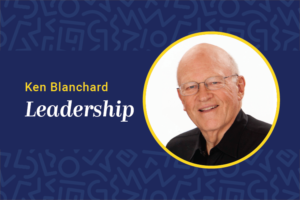
Change is inevitable. It’s how we adapt and react that matters most, in both work and life.
by Ken Blanchard
March 28, 2019

Long before the term “mindset” became a business buzzword, Spencer Johnson, my co-author on “The One Minute Manager,” was preaching the power of beliefs and the impact they can have on behavior and the results you and your organization achieve.
Spencer used to tell audiences the story of two mouse-sized characters named Hem and Haw who lived in a maze and were faced with unexpected challenges when the cheese they loved suddenly disappeared. “Cheese” was a metaphor for whatever nourished you, whether it was a good job, a loving relationship, money, possessions, good health or peace of mind. The “maze” was a metaphor for whatever difficult situation was keeping you from finding and enjoying your cheese. How each character reacted to the missing cheese provided valuable lessons about fear and change.
Twenty years ago, I encouraged Spencer to put this story into book form so others could benefit from its profound wisdom. He followed my advice and “Who Moved My Cheese?” was published in 1999. A year and a half ago, Spencer passed away, but his latest thinking is available in his posthumously published new book “Out of the Maze,” a sequel to “Who Moved My Cheese,” in which Spencer focuses on the how of dealing with change. He encourages readers to think outside the box — or maze, as it were — showing readers a pathway for adapting to change in their lives and work.
“A single stubborn belief can take down an entire company,” says Brooke, a character in “Out of the Maze.” She cites as an example a newspaper owner who refused to take his publication online, believing that print advertising would keep on paying the bills — even after the paper’s biggest accounts had switched to advertising on the internet. “A year after I arrived, the whole operation shut down,” Brooke says. In other words, leaders with outdated beliefs might not only hold themselves as prisoners; their people might become hostages as well.
Given the dynamic society surrounding today’s organizations, change is no longer a probability; it is a certainty. Helping people understand the power of beliefs and adapt to the reality of change were Spencer’s gifts to the world. His books inspire people at all organizational levels and from all walks of life.
I am sometimes asked if Spencer only wrote about the power of beliefs and adapting to change, or if he also lived by those principles. I’m happy to say he did indeed walk his talk but sad to give you this example.
I lost my co-author and friend to pancreatic cancer in July 2017. As you might know, when you’re diagnosed with that form of cancer, it’s usually very bad news, as few people survive for long. When Spencer got the word, he decided he could approach the rest of his life from a belief system based on fear or one based on love. If he chose fear, the focus would be on himself. If he chose love, the focus would be on others.I was overjoyed with his choice to live in love. He reached out not only to close family members and friends, but also to people with whom, for various reasons, he’d lost contact, some of whom he hadn’t spoken to in years.
The people I met during our final visits with Spencer were all struck by the way he focused on them and their feelings rather than on his own medical condition.
During my last visit with Spencer, we were joined by Margret McBride, who had been our literary agent for “The One Minute Manager.” We called Larry Hughes, the former president of William Morrow, who had published our books, to tell him how much we appreciated his role in our lives. It was a memorable, heartwarming conversation. As I was leaving, I gave Spencer a hug and told him how proud I was of him and the positive beliefs he had chosen.
Change is inevitable. It’s how we adapt and react that matters most, in both work and life.




